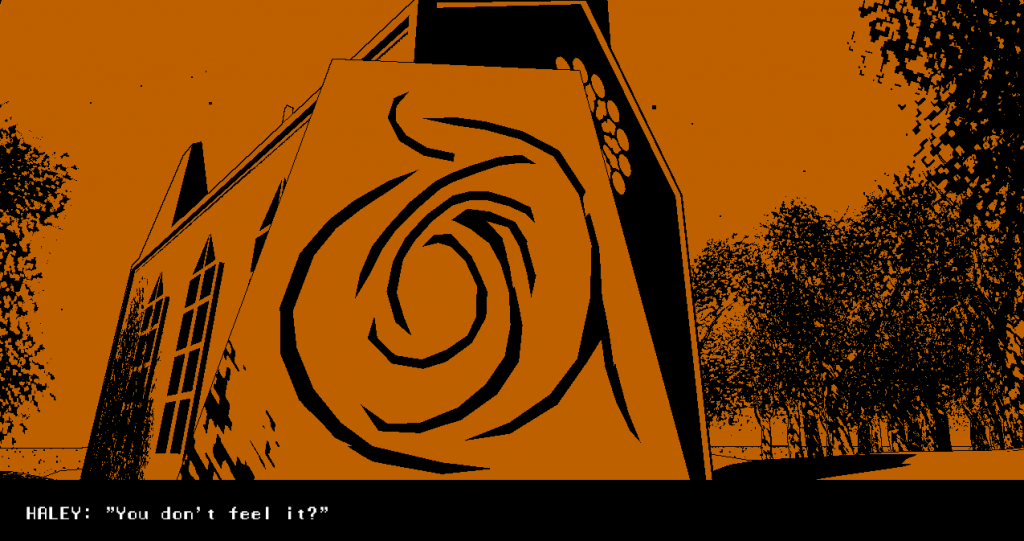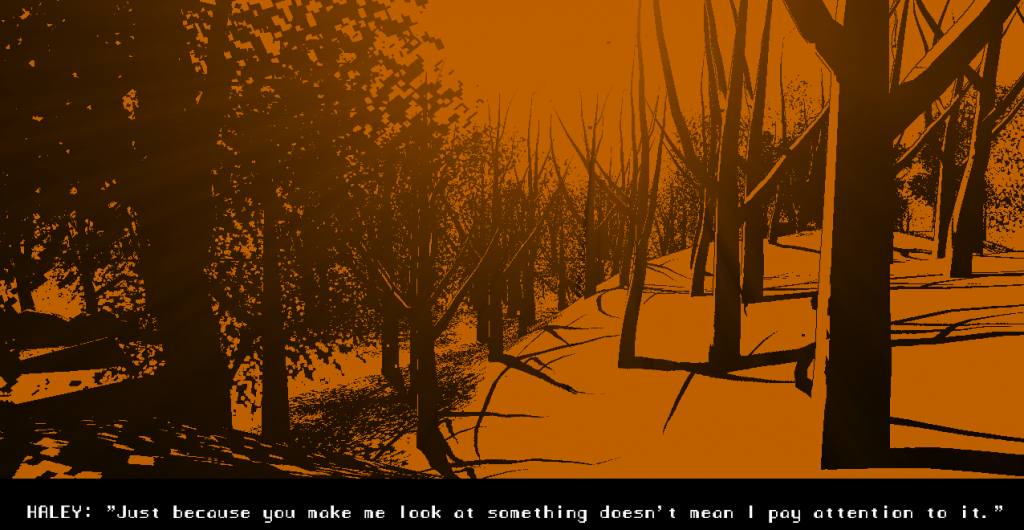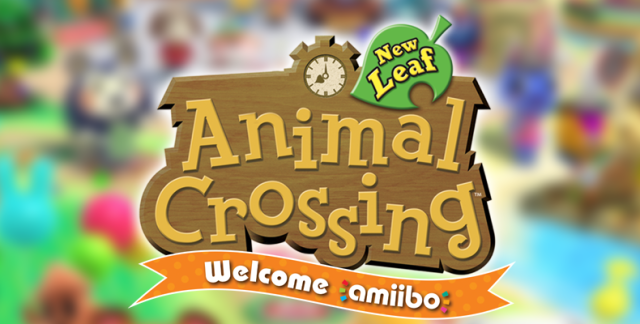The Music Machine delivers an experience that’s uncharacteristic of most horror games. There are no monsters chasing after you, despite the fact that they’d be right at home on the abandoned island where the game is set. There are no jump scares waiting for you around the corner (at least as far as I’ve seen), no matter how many dark hallways you wander down. And despite the fact that the indie game – which was developed and produced by David Szymanski and now available on Steam – revolves heavily around the supernatural, it never delves into the realm of the truly terrifying. Because instead of flat-out scaring its players, The Music Machine resonates due to the sheer amount of unease and discomfort it instills, some of which I enjoyed and some of which makes me question whether their decisions were really necessary or appropriate.
As a narrative-based game, gameplay within The Music Machine is fairly minimal. When you arrive on the island with only a message to “take your time” and explore slowly, it quickly becomes clear you’re on your own when it comes to figuring the game out. You receive very minimal prompts from the game itself, so if you’re looking for any real context or clues as to what to do next, you’re basically out of luck. Although this was somewhat annoying because I kept finding myself getting lost or forgetting where a particular building or item was or wandering around aimlessly (particularly at the beginning), the puzzles that make up the whole of the game’s actual gameplay were not too difficult to stumble upon and relatively simple to solve with a bit of detective work. The only tricky aspect I’ve come across so far is the fact that some items seem to serve no purpose other than to confuse or throw you off the trail. They seem to be put there only to act as red herrings, a point Szymanski himself confirmed. I kept growing paranoid because I’d come across all these items I couldn’t add to my inventory but could hold and throw and move. I’d worry that I was missing some big plot point because I couldn’t find out what to use these items on, particularly one glowing, sparkling object that looked like it had to be used somewhere but actually turns out to be a red herring (one Szymanski did confirm as having no use). Although some of these objects might be used later, it seems a little cruel to put them all out there just for a distraction. The sense of aimlessness, of not knowing where to go and of never really being given a goal or a direction is certainly different from most games (which generally have objectives, clues, and the like) and has a way of making you feel uneasy.
The extreme visual elements and environment of the game also contribute to this sense of unease and discomfort. At any given time the landscape is composed of only two colors: black and another bright, often vibrant color like orange or yellow or red. This effect, combined with shadowing, make the forests look creepy and harrowing. Objects are almost strictly geometric shapes, a point the characters themselves comment as odd. There are strange landscapes and objects that don’t seem to belong. Based on what I’ve seen so far, there seems to be some narrative meaning to the landscape and design, but regardless it certainly adds the surreal feel of the game.
Because narrative is the core focus of the game and does seem to inform many of the design choices of the game, it comes as no surprise that the narrative is The Music Machine’s most unique element. In the game you actually play as two characters: a thirteen year old girl named Haley and the vengeful spirit of a thirty-something year old man named Quintin who’s essentially possessed her body. Both Haley and Quintin’s consciousnesses are present, but Quintin has taken control of her physical self. Throughout the game the two, who are drastically different in personality and life experience, are constantly at odds. I must admit, for all the problematic reasons that has placed the two in this circumstance (which I will describe in a bit), their dynamics and interactions are engaging. I enjoy the way they interact with each other in every bit of dialogue we see between them even if I’m not sure what to make of the content.
(Some spoilers follow. Please be advised if you want to go into the game completely fresh.) We first learn that Quintin has brought Haley and her body to the island to investigate a string of strange murders that happened there. Later we learn that he’s done so specifically for the purpose of killing Haley; he wants whatever’s killing these people to gruesomely kill her as well. Finally we learn that he’s out to get Haley for inadvertently causing his death. We find out, through a conversation between the two of them, that Haley, in an attempt to get her father invested in her life, lied, saying Quintin molested her. Enraged, her father then confronted Quintin to get revenge and “filled him full of holes.”
When I first read this piece of dialogue between them, I was stunned. I was profoundly uncomfortable, and not in the enjoyable way that made horror games or movies fun and thrilling. Szymanski had employed an extreme example the “false victimhood” storyline to paint this thirteen year old girl as the villain. I’m not saying that this situation is impossible or could never happen, but I couldn’t help but think of how often the stories of real victims of molestation or sexual misconduct get dismissed as fake or are believed to be brought forward for some ulterior purpose. After all, it is implied that Hayley and Quintin did have some sort of relationship when Quintin was alive. Although we’re not sure what that relationship was exactly and despite Quintin making it clear that he thinks a man of his age interacting with Haley is inappropriate, it’s still implied that he did have some sort of relationship with her, to the point where she’s interested to know if he finds her attractive. While it’s certainly a unique situation Haley and Quintin are in and does make for an interesting dynamic, and while I certainly do not believe Haley was in the right in this situation, I don’t know what exactly to make of this narrative inclusion and worry that it villainizes Haley while glossing over any of Quintin’s possible mistakes.
The Music Machine is an uncomfortable experience. The lack of guidance, the eerie setting, and the odd and awkward relationship between Haley and Quintin all ensure that fact. But because of these, it’s also a compelling and intriguing experience, and certainly unlike any other game I’ve played before.






